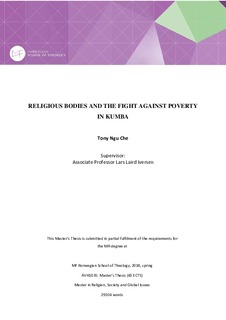| dc.description.abstract | The purpose of this study is to know the different engagement of religious bodies in the fight against poverty in Kumba looking at different social domains. In this light we seek to know how the presence of different religious bodies in the locality contribute in the fight against poverty. Growing in a society where religious diversity is fast growing in situations of complementarity and adversity, we took upon us to investigate not the dichotomy of religious in our said society, but to look at the potential these religious bodies could have in the fight against poverty. Upon this motivation we made our problem on this question: what are the different contributions of religious bodies in the fight against poverty in Kumba. In order to provide answers to the above problem, we used made use SWOT analytical method in a double phase. This was firstly in the phase of the research of information where we essentially made use of written sources. Here we essential looked at the strength, weakness, opportunities and threat of written sources. The second phase was during the analysis of data wherein we also took into account the Strength, Weakness, Opportunities and Threats of religious bodies in their action against poverty. This hence brought us to the main core of our research which is our findings.
From our finding we noticed from a general scope that religious bodies in Kumba are an important factor of development. This is because of their role as civil society organisation which gives them the legitimacy in the field of action of development, which is obviously that of poverty. Hence, they are eventually recognised by associative partner as a major actor in the action on poverty alleviation. It is in this sense that religious bodies in Kumba have moved from the purely spiritual mission to concretised action in the field of poverty alleviation. Their involvement is mirrored in the society by their actions in several social domains like: Education and Health as well economic actions like agriculture, empowerment and employment. The have a significant presence in the above domains as their impact in these domains are felt in double fold. However, after having a critical analysis of their role in poverty alleviation, it was evident that they have amongst other, the strength of the religious mission in the field. That notwithstanding the fundamental weakness of division involved in religion. But this does not hinders their mission because of the opportunities like the legal recognition and the trust of foreign partners. Religious bodies will be more effective in the fight against poverty if a better analysis of their strengths, weakness, opportunities and treats is made in the domain. | nb_NO |
